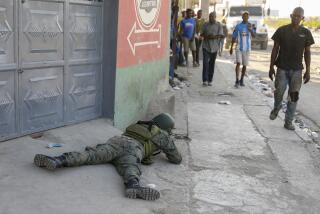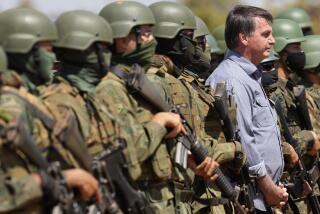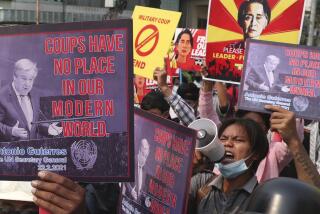EAST TIMOR : Manipulators of Mayhem
- Share via
WASHINGTON — Anarchy reigns in East Timor. But late on the afternoon of Aug. 30, I was optimistic. As a monitor for the Carter Center, I had just witnessed a successful, popular consultation of the East Timorese on their homeland’s future. Of those registered to vote, a stunningly high 98.6% had braved intimidation by Indonesian military forces and local militias to cast ballots either to accept autonomy inside Indonesia or to seek separation leading to independence.
They voted overwhelmingly, by a margin of 4-1, for separation, and then suffered a catastrophe of appalling proportions. The militias have embarked on a policy that might be termed “political cleansing”: killing independence supporters, injuring them or hounding them out of the territory.
Five explanations for this paroxysm of violence are being put forward by various parties, but only one of them squares with the reality on the ground.
The first is the one favored by the Indonesian government. It pictures a civil war unfolding in East Timor between pro-integration and pro-independence forces, with Indonesian authorities caught in the middle, understandably hard-pressed to restore peace. This account is blatantly false. On numerous occasions, I witnessed militia members perpetrating acts of violence in full view of heavily armed Indonesian police and military personnel who either stood by and watched or actively assisted the militias.
According to the second explanation, the militias’ rampage has been locally organized and instigated by the Indonesian military officers and units stationed in East Timor, without the knowledge, or with the knowledge but without the approval, of their superiors in Jakarta. This argument is implausible for several reasons.
Anyone who has interviewed high-ranking Indonesian officers in Jakarta in recent years will have been struck by their reluctance, if not their outright refusal, to let East Timor go. Even reformist officers who say they support democratization and greater civil authority in Indonesia typically draw the line at independence for East Timor.
Over the years of Indonesian repression in East Timor, special forces and intelligence units established a proprietary role for themselves in the territory. Indonesia’s dominion grew out of covert operations conducted by officers with backgrounds in intelligence. In May 1998, the commander of the Indonesian armed forces, Gen. Wiranto, disciplined and ousted from the army a former head of special forces, Prabowo Subianto, who had threatened his position. But Wiranto did not purge Prabowo’s network of allies and supporters, who remain to this day active and influential in East Timor.
Some say Wiranto is too weak to order the local commanders in East Timor to arrest and disarm the militias. But he was strong enough to remove Prabowo last year, and, since then, he has consolidated his position. Indeed, he is often discussed as a possible candidate to be elected vice president of the country by the People’s Consultative Assembly in November. Perhaps he is reluctant to discipline the Timor command lest doing so jeopardize the intramilitary support he will need to pursue higher political office.
Another reason to suspect high-level military complicity in what is going on in East Timor is the desire of army leaders to prevent events in East Timor from sparking the dismemberment of Indonesia. By ratcheting up the violence immediately after the vote, the military may be sending an intimidating message to Aceh, Irian, Jaya and other restive outlying provinces. That message might be summarized: Do not go for independence. The Timorese did, and look what it got them.
For these reasons, ultimate responsibility for the catastrophic conditions prevailing in East Timor must be assigned to the Indonesian military, not only local units but also their superiors in Jakarta, who by action or inaction have encouraged or tolerated the present frenzy of destruction.
The fourth explanation is that the mayhem in East Timor was ordered by Indonesian President B.J. Habibie. This is highly doubtful. It was, after all, Habibie who initiated the process of self-determination last January, when he proposed consulting the East Timorese on their fate, a step he took without first obtaining army approval. Army leaders, never close to the president, were furious that Habibie had gone over their heads to initiate an act of self-determination in “their” territory, even though the event was billed as purely advisory. That army units could so flagrantly frustrate Habibie’s plan shows how little control over the army he has. Indeed, it is possible that his presidency may not survive the crisis.
The final explanation attributes the depradations in East Timor to Suharto, who resigned his presidency in May 1998 and returned to private life. But Suharto is seriously ill, too ill to be directing events in East Timor by remote control. The recourse to official violence that characterized his authoritarian regime did create a climate and an apparatus conducive to repression, including repression in East Timor. But the militias are not being manipulated by Suharto.
If the Indonesian army, including its leadership, is responsible for the mayhem in East Timor, it follows that U.S. policy should pay particular attention to that institution and its leadership. The announced suspension of military-to-military relations between Jakarta and Washington is a step in the right direction. Such ties should not be restored unless and until the militias in East Timor are brought to heel: disarmed, arrested and eventually tried for what they have done. By singling out the military in this manner, the U.S. is also sending a message to the civilian leadership in Indonesia that we are not trying to make an enemy of their entire country.
By this same logic, it would be unwise to cancel all foreign assistance to Indonesia as punishment for what is happening in East Timor. Take the World Bank’s effort to provide a social-safety net to the country’s many poor people, including those impoverished by last year’s double-digit shrinkage in Indonesia’s gross domestic product. Or USAID and the congressionally financed Asia Foundation’s efforts to support NGOs, civil society, democratic governance and the rule of law. One may wonder at the consistency of a policy that in the name of democracy for 850,000 East Timorese threatens to terminate programs to help bring democracy to 220 million Indonesians.
Depending on the behavior of Indonesia’s government, it may well be appropriate to delay the next installment on the International Monetary Fund package of structural loans, though slashing such support could lead to higher prices for basic commodities and services in Indonesia. This, in turn, could cause more violence, especially in already volatile urban and semiurban areas.
Whatever else it does, the U.S. government should substantially increase pressure on Habibie to allow an armed peacekeeping force to stop the violence in East Timor and restore order there if Jakarta cannot do so. Such an intervention should be coordinated with Australia, Asian and other countries. U.S. support, at least in the form of logistics such as airlift capability, would send an appropriate signal to Indonesia and the world that the United States cannot stand passively by while a legitimate act of democratic self-determination is drowned in blood and flames.*
More to Read
Sign up for Essential California
The most important California stories and recommendations in your inbox every morning.
You may occasionally receive promotional content from the Los Angeles Times.













